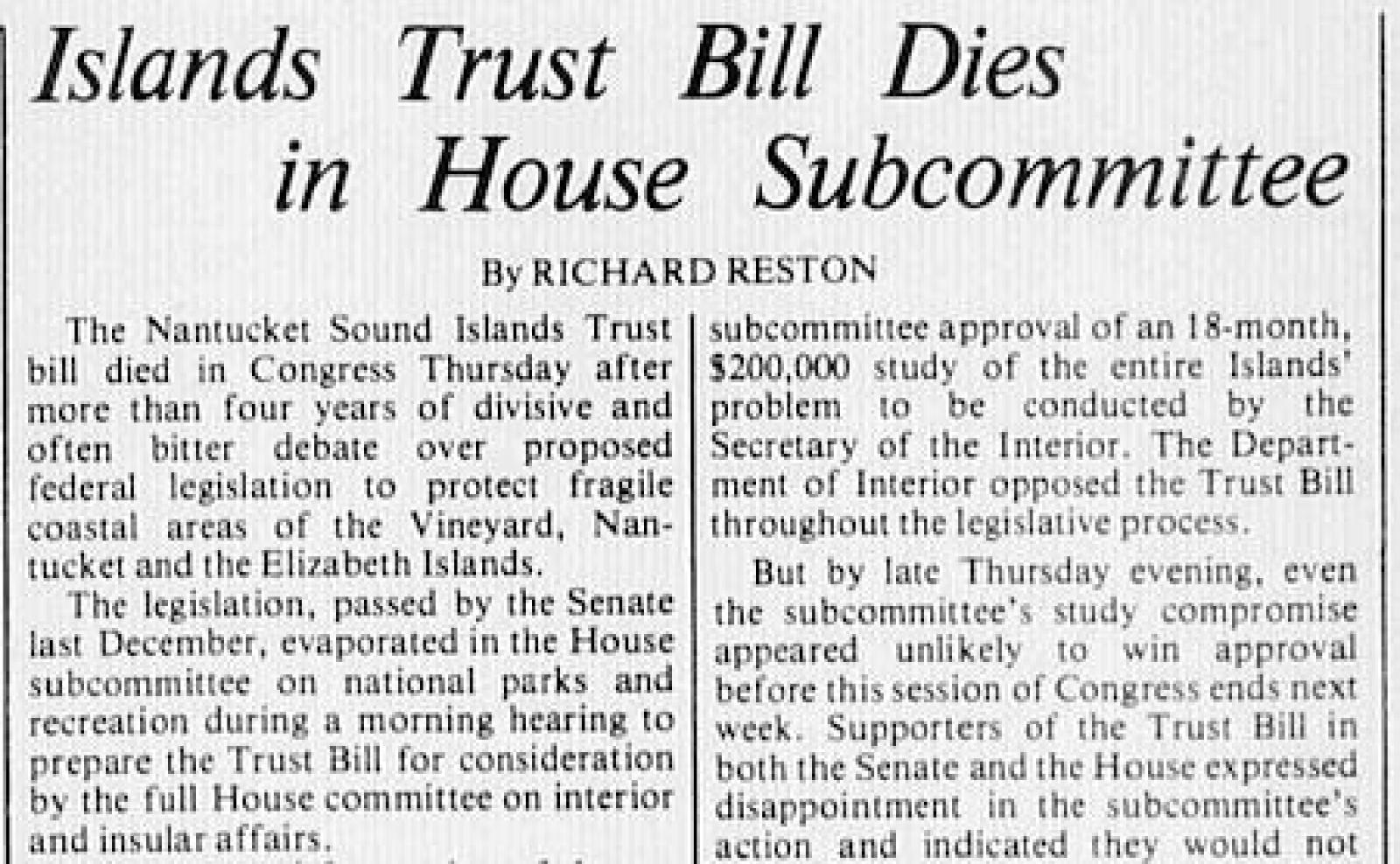The Nantucket Sound Islands Trust bill died in Congress Thursday after more than four years of divisive and often bitter debate over proposed federal legislation to protect fragile coastal areas of the Vineyard, Nantucket and the Elizabeth Islands.
The legislation, passed by the Senate last December, evaporated in the House subcommittee on national parks and recreation during a morning hearing to prepare the Trust Bill for consideration by the full House committee on interior and insular affairs.
What emerged from ashes of the so-called Kennedy Bill was what Washington describes as a “compromise” or “substitute,” specifically subcommittee approval of an 18-month, $200,000 study of the entire Islands’ problem to be conducted by the Secretary of the Interior. The Department of Interior opposed the Trust Bill throughout the legislative process.
But by late Thursday evening, even the subcommittee’s study compromise appeared unlikely to win approval before this session of Congress ends next week. Supporters of the Trust Bill in both the Senate and the House expressed disappointment in the subcommittee’s action and indicated they would not support the substitute.
A spokesman for Rep. Gerry E. Studds, the principal sponsor of the legislation on the House side, said: “We’re disappointed. It’s not what we wanted, but we can live with it. At least the House recognizes the Islands do have a problem, and it is willing to look at that problem.”
From the offices of Sen. Edward M. Kennedy and Edward W. Brooke came this statement:
“We were disappointed today to learn that the House interior subcommittee on parks and recreation failed to report favorably a Nantucket Sound Islands Trust bill which would fund local commissions to prepare their own land use plans for the Islands.
“During the five years we have worked with the Island residents on legislation to protect the Islands, all have agreed that the future growth of the Islands must be shaped by Island residents.
“The bill approved by the House subcommittee providing that the Secretary of the Interior conduct a study simply does not begin to meet the needs of the Islands. The Senate interior committee shares our view that the House bill does not reflect the intentions of the Senate-passed Nantucket Sound Islands Trust bill.
“Sen. Henry M. Jackson of Washington (chairman of the Senate interior and insular affairs committee has indicated he will expedite Nantucket Sounds Islands Trust legislation in the new Congress.”
Mr. Studds’ position, according to his press secretary Drew Steiss, was that the compromise to study the problem of the Islands was better than getting nothing at all from Congress.
Senate sources disagreed. “The House action is not better than getting nothing as some people are now arguing,” said one person close to the legislative process.
The statement from Senators Kennedy and Brooke, coupled with comments from other congressional sources, suggested the Senate will refuse to go along with the House proposal to substitute a prolonged study for specific legislation to protect the Islands.
Comments from the two Massachusetts senators also pointed to new congressional attempts to revive the Trust Bill in the next session of the Congress.
Critics of the bill have long argued that congressional approval of the Trust legislation would give the federal government too much control over local affairs. Supporters of the legislation have argued that this is not so, that if anything the weakness of the bill was that there was too little federal oversight of funds that would have been allocated to local Island communities.
In the end, congressional sources said the legislation died because there was no time left to iron out controversial parts of the bill before Congress recesses early in a presidential election year.
These sources also indicated the $30 million allocation contained in the House version of the legislation to acquire and protect land was a serious stumbling block. They said a number of subcommittee members were uncertain about how much land might have to be acquired and at what eventual cost. The Senate version of the bill passed late last year carried a $10 million allocation.







Comments